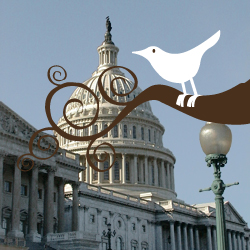 According to Tricia Duryee of paidContent, Twitter has been experiencing something of a resurgence lately. Traffic is at an all time high, its valuation is through the roof, and the service is even more stable than it has been in months. However, even if Twitter is “winning the microblogging arms race,” as Newsweek put it, one place Twitter may not be seen is in the halls of the US government.
According to Tricia Duryee of paidContent, Twitter has been experiencing something of a resurgence lately. Traffic is at an all time high, its valuation is through the roof, and the service is even more stable than it has been in months. However, even if Twitter is “winning the microblogging arms race,” as Newsweek put it, one place Twitter may not be seen is in the halls of the US government.
The microblogging site has been causing a minor brouhaha in the US capitol for the past couple of weeks. Because House of Representatives rules state that any official communications from Congressional members must be labeled as such, communicating with constituents via Twitter — which imposes a 140 character limit per message — becomes infeasible. Further proposed rules about communications on sites that may run political ads have added to flame to the fire.
For Texas Rep. John Culberson, a Republican, who has his own Twitter account, proposed rules by Massachusetts Democrat Rep. Michael Capuano are unacceptable. The rules would be meant “to prevent members from using public money to communicate on outside Web sites featuring commercial and political advertisements,” but Culberson claims that would all but kill his ability to communicate with constituents via Twitter, because seeking Congressional approval to tweet flies in the face of the instant appeal of Twitter. For his part, Capuano says the rules are aimed solely at video postings, and not any form of written communication.
Either way, Culberson, along with Democrat Rep. Tim Ryan of Ohio, who also Twitters, have backed an online, Twitter-powered petition at LetOurCongressTweet.org. The site calls for Congress to “to embrace the communication technologies that we already use,” rather than adding barriers to tweeting. Anyone who tweets with the hashtag #LOCT08 will sign the petition (“signatures” are compiled by Summize, which is now owned by Twitter). So far, just over 600 people have signed.
“Citizens are overcoming their fears about engaging online, and Congress should follow suit,” said the Sunlight Foundation, the non-partisan group that set up the Let Our Congress Tweet petition. Large governments rarely seem to act fast when it comes to embracing consumer communications technologies, so it’s not surprising that something as seemingly benign as using Twitter to chat with constituents would be bogged down in bureaucracy.
In an interesting twist, Rep. Capuano is in his own district potentially facing a reelection campaign against an “Internet candidate” — one that would no doubt find embracing Twitter and other forms of online communication a necessity.
Note: Special thanks to my friend Kelli Shaver, who made the Twitter bird + Capitol building graphic when my limited Photoshop skills failed me.
 Josh Catone
Josh CatoneBefore joining Jilt, Josh Catone was the Executive Director of Editorial Projects at Mashable, the Lead Writer at ReadWriteWeb, Lead Blogger at SitePoint, and the Community Evangelist at DandyID. On the side, Josh enjoys managing his blog The Fluffington Post.
